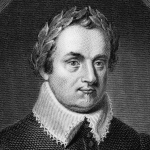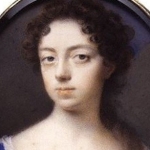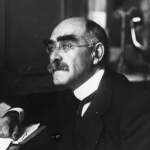Her lily hand her rosy cheek lies under,
Cozening the pillow of a lawful kiss;
Who, therefore angry, seems to part in sunder,
Swelling on either side to want his bliss;
Between whose hills her head entombed is;
Where like a virtuous monument she lies,
To be admired of lewd unhallowed eyes.
Without the bed her other fair hand was,
On the green coverlet, whose perfect white
Showed like an April daisy on the grass,
With pearly sweat resembling dew of night.
Her eyes, like marigolds, had sheathed their light,
And canopied in darkness sweetly lay
Till they might open to adorn the day.
Her hair like golden threads played with her breath
O modest wantons, wanton modesty!
Showing life’s triumph in the map of death,
And death’s dim look in life’s mortality.
Each in her sleep themselves so beautify
As if between them twain there were no strife,
But that life lived in death, and death in life.
Her breasts like ivory globes circled with blue,
A pair of maiden worlds unconquerèd,
Save of their lord no bearing yoke they knew,
And him by oath they truly honourèd.
These worlds in Tarquin new ambition bred,
Who like a foul usurper went about
From this fair throne to heave the owner out.
What could he see but mightily he noted?
What did he note but strongly he desired?
What he beheld, on that he firmly doted,
And in his will his willful eye he tired.
With more than admiration he admired
Her azure veins, her alabaster skin,
Her coral lips, her snow-white dimpled chin.
As the grim lion fawneth o’er his prey
Sharp hunger by the conquest satisfied,
So o’er this sleeping soul doth Tarquin stay,
His rage of lust by gazing qualified;
Slacked, not suppressed; for, standing by her side,
His eye, which late this mutiny restrains,
Unto a greater uproar tempts his veins.
And they, like straggling slaves for pillage fighting,
Obdurate vassals fell exploits effecting.
In bloody death and ravishment delighting,
Nor children’s tears nor mothers’ groans respecting,
Swell in their pride, the onset still expecting.
Anon his beating heart, alarum striking,
Gives the hot charge and bids them do their liking.
His drumming heart cheers up his burning eye,
His eye commends the leading to his hand;
His hand, as proud of such a dignity,
Smoking with pride, marched on to make his stand
On her bare breast, the heart of all her land,
Whose ranks of blue veins, as his hand did scale,
Left their round turrets destitute and pale.
They, mustering to the quiet cabinet
Where their dear governess and lady lies,
Do tell her she is dreadfully beset
And fright her with confusion of their cries.
She, much amazed, breaks ope her locked-up eyes,
Who, peeping forth this tumult to behold,
Are by his flaming torch dimmed and controlled.
Imagine her as one in dead of night
From forth dull sleep by dreadful fancy waking,
That thinks she hath beheld some ghastly sprite,
Whose grim aspect sets every joint a-shaking.
What terror ‘tis! but she, in worser taking,
From sleep disturbèd, heedfully doth view
The sight which makes supposèd terror true.
Wrapped and confounded in a thousand fears,
Like to a new-killed bird she trembling lies.
She dares not look; yet, winking, there appears
Quick-shifting antics ugly in her eyes.
Such shadows are the weak brain’s forgeries,
Who, angry that the eyes fly from their lights,
In darkness daunts them with more dreadful sights.
His hand, that yet remains upon her breast
(Rude ram, to batter such an ivory wall!)
May feel her heart (poor citizen) distressed,
Wounding itself to death, rise up and fall,
Beating her bulk, that his hand shakes withal.
This moves in him more rage and lesser pity,
To make the breach and enter this sweet city.



















Comment form: